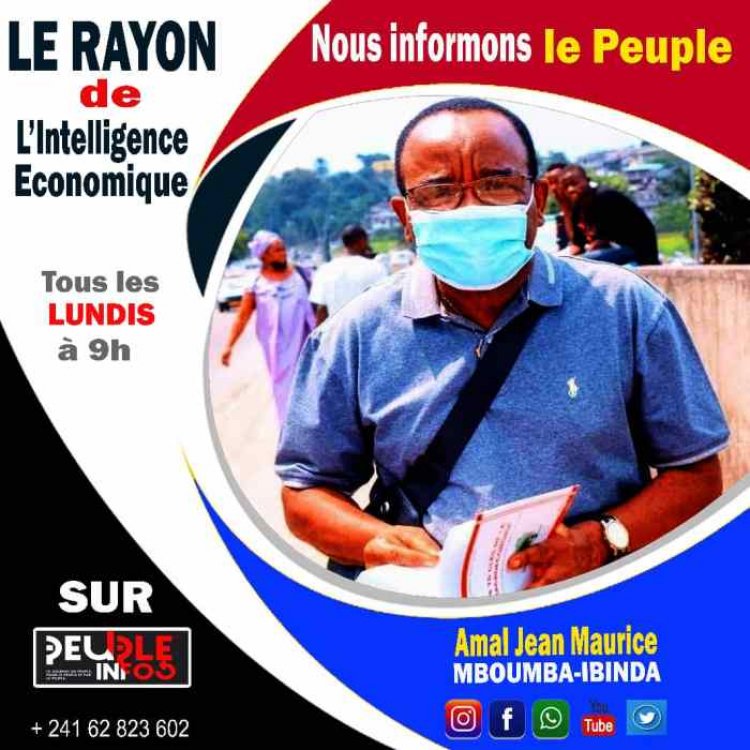THE RAY OF ECONOMIC INTELLIGENCE/ Gabon - Expensive life : origins, causes and solutions


This recurring problem cannot leave leaders who have decided to act unmoved.
In order to clearly define this problem, we will analyze using simple, not very technical concepts (in order to facilitate understanding),
the phenomenon and its different aspects, as it occurs in Gabon.also, we are going to examine there the origins of the expensive life; the main causes as well as possible solutions initiated by the Gabonese State, with a view to mitigating the effects of this crisis linked to the under-consumption of foodstuffs and other common goods.
Political and financial origins
Let’s start with the year 2009, the date of the accession to power of the President of the Republic Ali BONGO ONDIMBA.
Indeed, thanks to his social project to which the majority of voters had adhered, namely *to make Gabon an emerging country in 2025*, the young and ambitious Head of State and leader of the *Renovator* movement of the Democratic Gabonese; Ali BONGO ONDIMBA wanted to innovate in order to respond to thebetter and quickly to the needs of the development of its compatriots.He thus set up AGNTI, an investment agency, responsible for boosting Gabon’s economy; and integrated within it, high-level executives, the majority of whom were young people of all sexes.
This first mandate had known success and notable progress, particularly in terms of communication infrastructure with the construction of the national road in the south of Gabon.
Among the projects carried out, the Fougamou-Mouila road; Mouila-Ndende; Ndende-Tchibanga; Tchibanga-Mayumba; with, as a bonus, the construction of the gigantic bridge over the Banio in Mayumba.
In general and at the macroeconomic level in particular, the year 2009 had been satisfactory with an outstanding public debt of the country estimated at 25 percent of the Gross Domestic Product (GDP) despite the shortcomings recorded in terms of good governance.
Indeed, these large-scale works undertaken not only in the South but also in the North and in the eastern part of the country, required the provision of colossal financial, technical and logistical resources.

However, the setting up of the major works agency as well as the established management system, which is inconsistent with budgetary orthodoxy, has caused unprecedented financial bulimia.
Moreover, this had negative effects on the public debt. at the origin of these, poor management having forced the government of the time to set up a few years later, the first structural adjustment program (SAP) thanks to the collaboration of the State with the Fund International Monetary Fund (IMF).
With the financial means obtained from international financial institutions, which were accompanied by a substantial service, and despite the renewed upturn, Gabon’s public debt subsequently experienced dazzling growth, exacerbated by the Corona virus .
The COVID-19 pandemic and its effects on the consumption of everyday goods
Intervening three years after the start of the second term obtained by the President of the Republic Ali BONGO ONDIMBA, this term was deeply disrupted by a difficult health situation. the Gabonese economy has de facto been affected in its most sensitive sectors. Among them, the health and informal sectors.
The health sector
The Covid 19 pandemic has hit and disrupted the country’s most fragile and poorest social strata.
Among the main causes, the mismanagement by the successive governments of Prime Minister OSSOUKA RAPONDA, who benefited from the colossal means, provided not only by the Gabonese State but also by other international financial institutions with which our countrycollaborates as well as by certain political leaders of countries that are friends of Gabon.During the pandemic, the smallest and most fragile businesses ceased to operate.
Transport services were very disrupted, hospitals, dispensaries and health centers too.
Cloistered at home, following the instructions given by health officials, responsible for managing the pandemic, including the supervising minister, the Gabonese populations, including those of large cities (greater Libreville) have suffered enough from hunger and opportunistic diseases;the food system put in place having worked very badly, the citizens had their lives saved thanks to the system of resourcefulness, the « save who can », with the social effects, the rise of insecurity relating to multiple robberies and thefts with break-ins or at gunpoint.

Gabon small and medium-sized private enterprisesdeprived of real aid from the State, capable of coping with the effects of the pandemic, private SMEs and SMIs have seen their savings swallowed up by the crisis, unable to produce foodstuffs for everyday consumption.
they ended up closing and « drawing the curtain » to make way for poverty and malnutrition.
The weakened informal sector
The informal sector has been destroyed down to its most artisanal structures in the major crossroads, shop fronts or large urban markets.
Desolation and insecurity have settled there despite the presence and mixed controls of the police and defense forces.
The economic system, affected in its most sensitive sectors, disjointed, recorded serious dysfunctions which paralyzed production structures.
Despite the combined efforts of the government and international financial institutions to support the macroeconomic balances sought by the ongoing structural adjustment program, the outstanding public debt has reached bleak peaks.
According to the review of the American rating agency Fitch ratings, Gabon’s outstanding public debt is estimated at 6,500 billion FCFA, or 80 percent of GDP.
Other combined factors of the current crisis: the poor governance of the second presidential term exacerbated by the massive financial embezzlement, following the health crisis of the President of the Republic Ali BONGO ONDIMBA as well as by the war between Ukraine and Russia.
Mismanagement and massive financial embezzlement it is the work of a former direct collaborator of the President of the Republic ; a certain BLA who, taking advantage of the state of health of his boss and by means of a refined perfidy, arrogated to himself the powers of decision and action in his rank and grade, helped in his dirty work by a bignumber of members of government, executives and heads of certain institutions, mostly young people. Yet Gabonese youth, women too, have long constituted for Ali BONGO ONDIMBA, a privileged social class since his accession to the supreme magistracy; the decade dedicated to them bears witness to this; evidence of the potential socio-economic and political dynamics that thesetwo categories would embody in the eyes of the President of the Republic.A mistake, these fringe of the population having rather shone with a pronounced appetite for political power and the lure of easy financial gain.
Indeed many have occupied the juiciest positions in the administration, companies and financial management. they used it, without reserve.
All this on the back of the first institution of our country, the Presidency of the Republic.
The colossal money supply thus generated has become uncontrollable by the services of the central bank, responsible for regulating it.
It inevitably disrupted the production and consumption mechanisms of the country; thus causing a major imbalance between the supply and demand of foodstuffs and other consumer products throughout the territory.
This imbalance is all the more pronounced as Gabon imports nearly 80 percent of the quantity of imported foodstuffs consumed by the population.

Worse, the shortage of cereal-based products, oil, milk, etc. is exacerbated by the sanctions decreed by Western countries in particular and those of the European Union, in retaliation against Russia, following the war against Ukraine.
Conclusion
The food crisis as well as that linked to the consumption of basic necessities are explained by the dysfunctions recorded by poor governance at the highest level of the State; the massive financial embezzlement of public funds as well as the crises linked to theCovid 19 pandemic and the war in Ukraine.This imbalance is certainly serious but it is not insurmountable because falling under what one qualifies in economy of “cyclical crisis”.
In Gabon, the President of the Republic Ali BONGO ONDIMBA, has fully grasped the magnitude of the problem as well as its cross-cutting effects.
In fact, he not only took sanctions against the perpetrators of serious embezzlement and financial embezzlement but also initiated an ambitious plan, the one called « Plan for the Acceleration of Transformation (PAT) of the economy, development and growth from the country.
Indeed, just a few months before the presidential election scheduled to take place in 2023 and given the socio-political challenges it presents, Gabon could regain a substantial, sustainable macroeconomic balance.
A rebalancing, moreover, supported by international financial institutions such as the IMF, particularly in the rigorous management of the debt and its service.
However, to achieve this, the highest authorities, headed by His Excellency ALI BONGO ONDIMBA, the various partners, particularly private ones, civil society, must put in place effective mechanisms as well as a government with men and womenhonest, courageous and faithful to the ideals advocated by the highest political authorities and capable of realizing the ambition of the President of the Republic Ali BONGO ONDIMBA, that of the accelerated transformation of development and growth, a factor in the well-being of his compatriots.
Amal Jean Maurice MBOUMBA-IBINDA
Journalist
Economist
geopolitical scientist
Geostrategist











